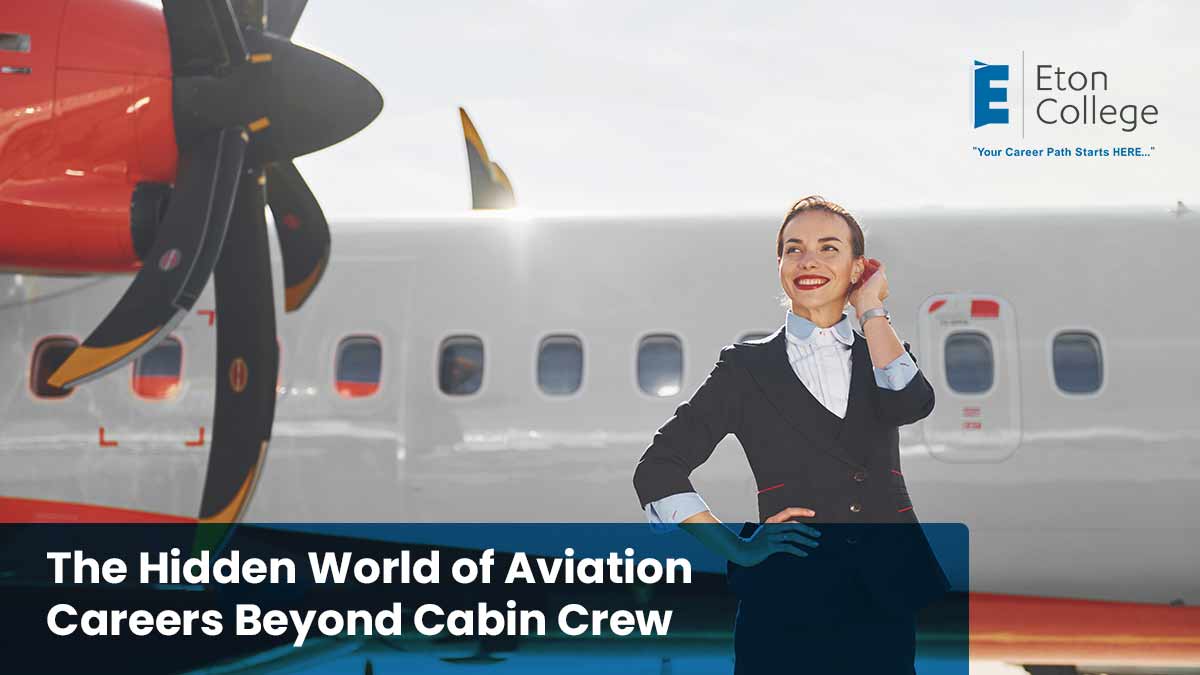- The aviation industry offers a variety of careers beyond pilots and flight attendants, each crucial to its success.
- Aircraft Maintenance Engineers ensure aircraft safety through meticulous maintenance and inspections.
- Aviation Safety Inspectors enforce regulations to maintain high safety standards across the industry.
- Flight Dispatchers plan and coordinate flight operations, ensuring efficiency and safety.
- Aviation Management Professionals oversee airline and airport operations, contributing to the industry’s seamless functioning.
The aviation industry is vast, and dynamic in scope with work done far beyond the roles of the common and familiar flight attendant or pilot. What is not quite obvious is that several professionals who are involved in air travel play their part behind the scene for safety, efficiency, and advancement.
In this article, we will examine some of these lesser-known jobs in aviation. We will highlight the various opportunities available in this industry.
Aircraft Maintenance Engineers
Aircraft Maintenance Engineers are unsung heroes who keep the airplanes in ideal condition. They perform routine maintenance, inspections, and repairs to ensure that the planes meet strict aviation regulations and are safe for flight.
Their work involves routine checks of lines, complex assembling and disassembling procedures, and inspection procedures; and they normally work shift by shift, around the clock. Their technical competence and problem-solving skills will have to be very resourceful to ensure that this does not happen because that could ultimately jeopardize the prospects of airlines and compromise passenger safety.
Aviation Safety Inspectors
Aviation Safety Inspectors act as guardians of the skies. They make sure that safety standards are strictly followed, whether it is through the maintenance records of an aircraft or pilot training programs. The potential risks are identified before they turn into accidents. With aviation technology constantly changing, ASIs must keep pace with these changes, from the introduction of new drone regulations to other unmanned aircraft. Their job will require combining technical expertise and meticulousness with a firm commitment to safety, for they all play a crucial part in upholding the safety record of flying.
Flight Dispatchers
Flight Dispatchers, also known as “ground pilots,” play a crucial role in the efficient and safe takeoff of flights. These dispatchers meticulously plan their routes of flight, keeping in mind the complex forecasts of weather conditions, and consuming less fuel. They carry out thorough analyses of multiple data, including real-time conditions of weather, wind patterns, and turbulence, for safe and comfortable flight routing. They also oversee fueling and passenger boarding, and liaise with pilots and air traffic control, acting as a critical communication hub to ensure smooth operations.
Air Traffic Controllers
Air Traffic Controllers are responsible for coordinating the movement of aircraft on the ground and in the air. They play a vital role in preventing collisions, managing traffic flow, and ensuring that aircraft operate safely and efficiently. The work requires effective communication skills, prompt decision-making when there is a crisis, and knowledge of the laws of aviation as well as proper procedures. Without their profession, global air travel becomes a very complicated and dangerous scenario.
Aviation Management Professionals
Aviation Management Professionals oversee many aspects of airline and airport operations, such as finance, marketing, human resources, and strategic planning. They ensure that the aviation business runs smoothly, efficiently, and profitably. Their role is one of making crucial decisions that have a direct impact on day-to-day operations and long-term strategies of aviation organizations. A strong understanding of the aviation industry combined with business acumen will make them successful.
Aerospace Engineers
Aerospace Engineers specialize in designing, developing, and testing aircraft and spacecraft. They support innovations in aviation technology as they work on projects that can range from developing a new aircraft model to improving existing models’ performance and safety features. Their work requires the foundational knowledge of mathematics, physics, and engineering principles; in addition, creativity and the ability to solve problems are essential. Thus, aerospace engineers play an important role in shaping the future of air travel.
Aviation Meteorologists
Aviation Meteorologists offer critical weather information essential for pilots and flight planners to make informed decisions that ascertain flight safety and efficiency. They analyze weather data; forecast conditions along flight routes and advise on dangers posed by weather conditions. Thus, their expertise is in planning safe and efficient pathways, avoiding turbulence, and even ensuring passenger comfort. Since weather determines much of the operation in these industries, Aviation Meteorologists are indispensable.
Exploring Aviation Industry Opportunities
As you can see, the aviation industry offers a wide array of career opportunities beyond the traditional flight attendant career. These roles are integral to the industry’s success, each contributing uniquely to the safety, efficiency, and advancement of air travel. Whether you’re interested in engineering, safety inspection, flight planning, air traffic control, management, or meteorology, the aviation sector provides diverse paths to explore.
Exploring these aviation careers reveals a diverse array of opportunities that extend beyond the traditional flight attendant career. The aviation industry is a dynamic field that offers numerous aviation industry opportunities for individuals with varying skills and interests. Whether you’re passionate about engineering, safety, logistics, or management, there’s a place for you in this ever-evolving sector.
Eton College’s Comprehensive Flight Attendant Preparation Program
One prime opportunity in the aviation industry is that of a flight attendant. Eton College’s Flight Attendant Preparation Program (FAPP) offers specialized training for individuals aiming to become flight attendants.
The program emphasizes practical skills through hands-on simulations, conflict resolution exercises, and emergency drills, equipping students to handle the diverse challenges of the role. Additionally, it incorporates emotional intelligence development and cultural sensitivity training, ensuring graduates can provide exceptional passenger experiences while maintaining safety standards.
FAQs
- What qualifications are required to become an Aircraft Maintenance Engineer?
Typically, a diploma or degree in aircraft maintenance engineering is required, along with certification from a recognized aviation authority. Hands-on experience through apprenticeships or training programs is also essential. - How can I pursue a career as an Aviation Safety Inspector?
A background in aviation, such as experience as a pilot, mechanic, or engineer, is often required. Additionally, knowledge of aviation regulations and safety standards is crucial. Relevant certifications and experience in safety management can enhance your prospects. - What skills are essential for a Flight Dispatcher?
Strong analytical skills, attention to detail, excellent communication abilities, and the capacity to work under pressure are vital. Knowledge of meteorology, flight planning, and aviation regulations is also important. - What training is needed to become an Air Traffic Controller?
Air Traffic Controllers typically undergo specialized training programs provided by aviation authorities or accredited institutions. This includes theoretical and practical training, simulations, and on-the-job experience. - Is a degree necessary for a career in Aviation Management?
While not always mandatory, a degree in aviation management, business administration, or a related field can be highly beneficial. Relevant experience in the aviation industry also enhances career prospects.




